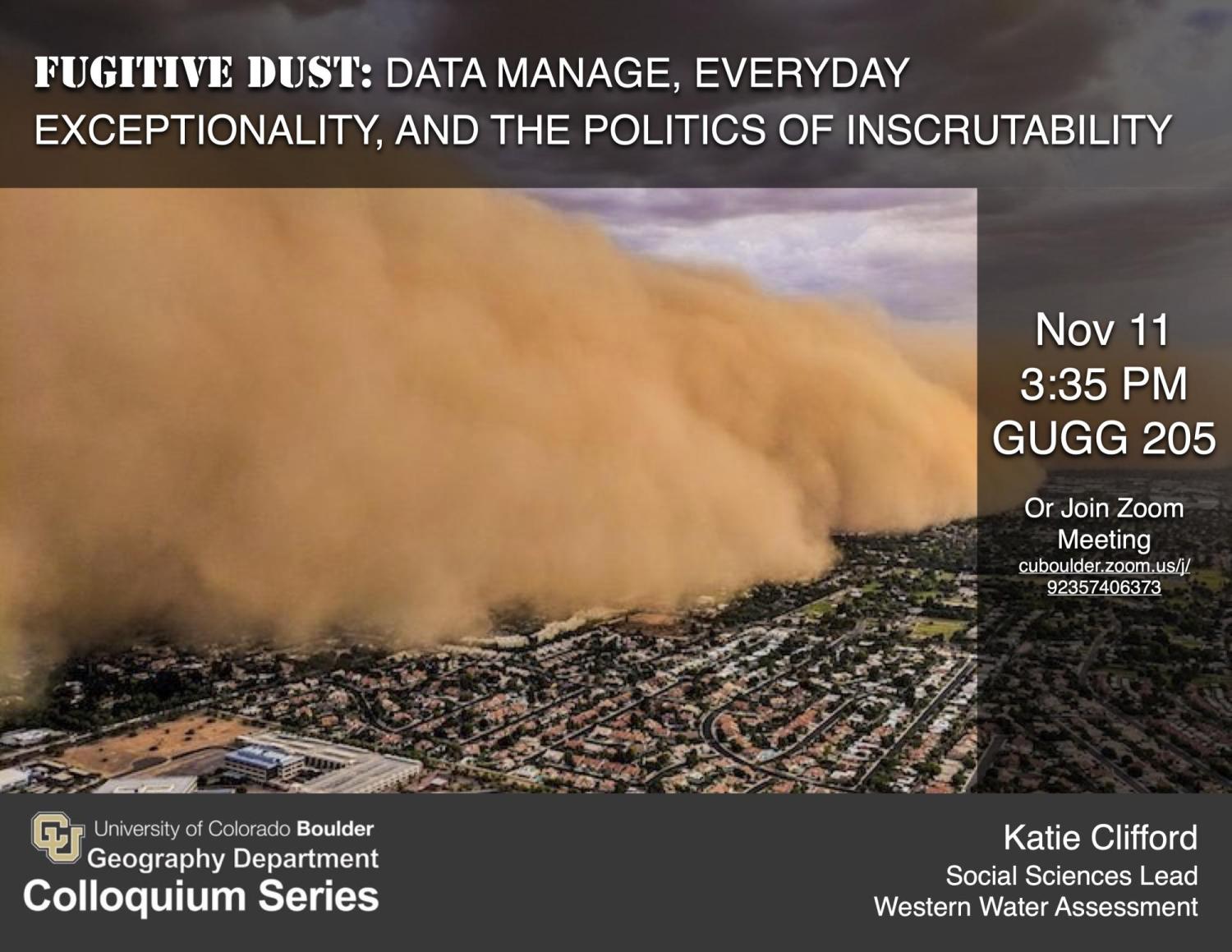Fugitive Dust: data manage, everyday exceptionality, and the politics of inscrutability
Katie Clifford
Social Sciences Lead
Western Water Assessment
In Person:
GUGG 205
Nov 11, 2022, 3:35 PM
Or Join Zoom Meeting:
Zoom login required (free account available at zoom.us)
Abstract
Exploring the politics of environmental knowledge has been a longstanding project of geographers. Equally important work is understanding the politics of environmental unknowns: how, why, and by whom certain spaces and environments remain inscrutable. My research asks questions about the politics of how we measure, monitor, and manage environmental systems and explores the consequences of uncertainty and data gaps. This becomes even more of an issue in the Anthropocene, an era of environmental change that complicates our ability to see emerging environmental issues and understand anticipated future conditions. Current data collection and management practices can mislead efforts to better adapt to new environmental conditions and create issues of environmental injustice.
I ground my analysis in a case study of dust in the southwestern United States which largely remains under monitored and unregulated despite many social and environmental consequences. I focus specifically on a case study of the Exceptional Events Rule (EER) of the Clean Air Act that excludes data, resulting in air quality events—and dust storms in particular—going unregulated. Using a mixed-methods approach including interviews, participant observation, document analysis, and spatial analysis, I trace the data exclusions and their consequences for air quality knowledge and regulation. This research identifies recursive process of distortion at play where constructing categories of abnormal–normal allows for the exclusion of “outliers” from data sets, which ultimately produces a false rarity and hides environmental changes. The talk concludes with a focus on my work at Western Water Assessment, a CU Boulder engaged research program, that brings this attention to environmental unknowns to issues of climate adaptation and justice.
Bio
Katie is human geographer who studies human-environment relationships in the context of environmental change. Her research blends a mix of methods, approaches, and theoretical frameworks to integrate theory and practice, aiming to engage with big questions within social science while also supporting adaptation, policy change, and real-world impact. She has expertise in
risk and hazards, climate adaptation, political ecology, critical physical geography, science and technology studies, co-production, and policy analysis. Broadly, Katie’s research explores the politics of environmental knowledge (and environmental unknowns) and the uneven patterns of environmental impact, especially from climate change. She is interested in how environmental monitoring and regulatory science is adaptive or maladaptive to socio-environmental change. Katie currently is the Social Science Lead for Western Water Assessment, a research program at the University of Colorado whose mission is to produce usable information to support regional climate adaptation in Colorado, Wyoming, and Utah. Her work focuses on supporting adaptation and resilience to climate hazards, particularly in frontline communities. Previously she worked at the USGS’s Social and Economic Analysis Branch as a Research Social Scientist working closely with the NPS Climate Change Response Program to better understand the human dimensions of responding to climate change on public lands. Katie received her B.A. at Macalester College and her master's and doctorate degrees in Geography from the University of Colorado at Boulder.
View Presentation
[video:https://vimeo.com/771369912]


